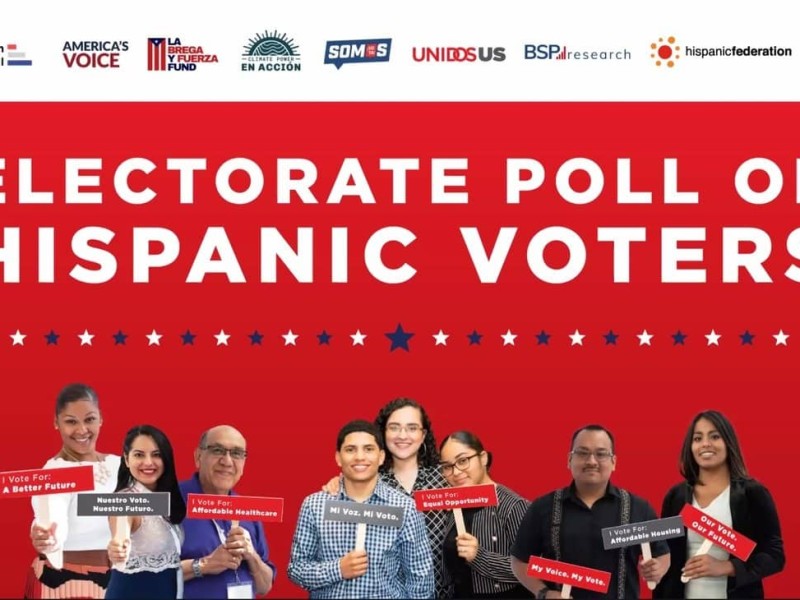Despite GOP Gains, American Electorate Poll Says Majority of Latinos Chose Harris
The American Electorate Poll (AEP), described as “a critical cross-check on traditional exit polls,” shared findings about Latino voters in the 2024 election cycle, according to a media release on Wednesday.

Originally published in The Latino Newsletter–reprinted with permission.
The American Electorate Poll (AEP), described as “a critical cross-check on traditional exit polls,” shared findings about Latino voters in the 2024 election cycle, according to a media release on Wednesday.
The poll of 3,750 Latino voters from October 18-November 14 focused mostly on 10 states (AZ, CA, FL, GA, MI, NC, NV, PA, TX, WI) and included an oversample of nearly 800 Puerto Rican voters shows Kamala Harris with a 62%-37% margin over Donald Trump. Harris won with Latino men (51%-48%) and Latina women (66%-32%). Puerto Ricans chose Harris by 65% and Mexican Americans by 63%. The only subgroup that Trump won, the poll noted, was with voters of Cuban descent (54%).
National exit polls on Election Day showed a 52%-46% national Latino advantage for Harris, with 55% Latino men choosing Donald Trump over 43% for Harris. Sixty percent of Latina women voted for Harris and 38% picked Trump. National exit polls had 2,152 Latino respondents.
The memo about the AEP added that Republicans had “a historic night” and “increased support across most demographics including Latinos.” The memo said the Election Day national exit polls “often rely on low and unrepresentative samples of Hispanic voters,” adding that the AEP “adds depth to our understanding of why and how Latinos and other groups voted.”
“Latino voters were not instrumental in the Trump victory. If no Latino had cast a ballot, the outcome would be unchanged,” a slide about the poll said. “This is true at the national level and likely every battleground state. However, had Latinos voted in ways similar to earlier elections, they may have prevented several states from flipping, though it is less clear that they could have reversed the outcome.”
Another slide said that “Exit polls are less reliable on sub-populations, for reasons of sampling and language-of-interview. Some of the exit poll estimates, if correct, would represent inter-election swings far beyond the expectation of most political scientists. To examine their accuracy, BSP and other organizations will examine precinct level data using Ecological Inference to arrive at a point estimate based on actual votes recorded. While we have just begun (precinct data become available slowly after elections), several examples suggest a significant ‘miss’ by the exits.”
The AEP also listed the top issues for Latino voters:
- Cost of living / inflation (52%)
- Jobs and economy (36%)
- Housing costs and affordability (27%)
- Health care costs (25%)
- Abortion and reproductive rights (23%)
In addition, the AEP provided breakdowns of several Latino subgroups. Here is what it shared:
- Latino National (Harris +24)
- Democrat (Harris +88)
- Women 40-59 (Harris +39)
- Central American (Harris +40)
- Women 18-39 (Harris +35)
- Puerto Rican (Harris +30)
- Bilingual Households (Harris +29)
- Mexican (Harris +27)
- Men 60+ (Harris +25)
- Spanish Households (Harris +25)
- Women 60+ (Harris +24)
- Men 40-59 (Harris +20)
- Dominican (Harris +19)
- English Households (Harris +17)
- South American (Harris +14)
- Independent (Harris +17)
- Men 18-39 (Harris +4)
- Cuban (Trump +9)
- Republican (Trump +87)
The findings of this poll were shared on a Wednesday afternoon press call, after an Election Day call was postponed so the “team can review the final election numbers at the county and precinct level.”
The video of the full press call is here.
An interactive version of the poll is here.
These are the breakdowns of respondents:
- N=500 per: Florida
- N=400 per: Pennsylvania, other states
- N=300 per: Arizona, Georgia, Nevada, North Carolina, Texas, California
- N=200 per: Michigan, Wisconsin
- N=790 per: Puerto Rican voters
The margin of error was +/-1.62%, and the survey was available in English and Spanish, according to respondent preference. It was a mixed-mode format: 75% online and 25% live telephone interviews,
This poll was conducted by BSP Research, whose co-founder was a pollster for the Harris campaign, and the African American Research Collaborative.
It was sponsored by SEIU, UnidosUS, First Nations Development Institute, Climate Power, Indivisible, Rural Organizing, Voter Participation Center, America’s Voice, and the American Civil Liberties Union.




